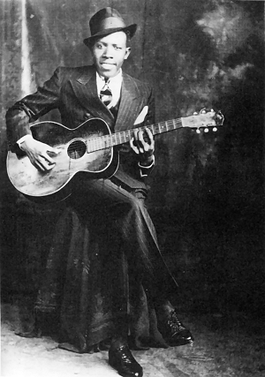Where Was Robert Johnson Cross Road Blues Recorded
Cross Road Blues
Robert Johnson, 1936
|
| ||||||
| "Cross Road Blues" recorded by Robert Johnson on The Complete Recordings, © 1989. Available on iTunes, Spotify, and YouTube. For more information on Robert Johnson, visit the Robert Johnson Blues Foundation. | ||||||
| Rights have not been secured to reprint the words for this song. Please consult this online source: http://xroads.virginia.edu/~MUSIC/blues/crb.html |
![]()
 |
| Robert Johnson |
Born in Hazlehurst, Mississippi, a small town south of Jackson, Robert Johnson (1911–38) is one of the most legendary blues guitarists and singers from the Mississippi Delta. As a young boy, he began playing harmonica and jaw harp (Jew's harp), and when he was about sixteen he began to play the guitar.
Many of the stories about Johnson's short life are uncorroborated, and his biography is filled with myth. He is known, however, to have made Helena, Arkansas, his base as he embarked on a career as a traveling musician in the 1930s. In 1936 and 1937, he traveled to Texas, where he completed two recording sessions, leaving a legacy of twenty-nine tracks. "Cross Road Blues" was recorded at the first session, in San Antonio. According to blues scholar Elijah Wald, this song conveys the "desperate loneliness that is the flip side of a traveler's freedom" (p. 156).
Influenced by other Delta bluesmen such as Son House and Lonnie Johnson, he developed a unique sound. He played the guitar with such skill that it sounded almost orchestral, as if multiple musicians were playing. He used a bottleneck slide to create whining sounds on the guitar, which he complemented with vocals that bent pitches to create whining "blue notes" that intensified the emotive quality of his singing.
Johnson had little influence during his lifetime, but just months after his death two of his recordings were played on a concert organized by John Hammond at Carnegie Hall in New York City. Later, following the release of seventeen of his recordings on the album King of the Delta Blues Singers (Columbia, 1961), he became widely regarded as the preeminent Black American blues singer. This album exerted a strong influence on white rock musicians, especially British bands, including Eric Clapton's band Cream as well as the Rolling Stones. Cream released a version of "Cross Road Blues," titled "Crossroads," on their album Wheels of Fire (1968).
Many of those who listened to King of the Delta Blues Singers saw Johnson's music as a pure form of folk music that was unadulterated by commercialism, but this view is one of the many myths that surrounds Johnson and his music. The truth is that Johnson was a highly skilled professional musician who developed his craft in order to make his living, and thus his art cannot be completely separated from commercial influences. Furthermore, the myth of the purity of Johnson's music has been criticized as resting upon the longstanding conception of the African or African American as a "noble savage," that is, a primitive human that is nonetheless exalted for being untainted by modern civilization.
In 1986 Johnson became one of the first inductees into the Rock and Roll Hall of Fame, which also named "Cross Road Blues" one of the "500 Songs That Shaped Rock and Roll."
Source: https://voices.pitt.edu/TeachersGuide/Unit7/CrossRoadBlues.htm
0 Response to "Where Was Robert Johnson Cross Road Blues Recorded"
Post a Comment